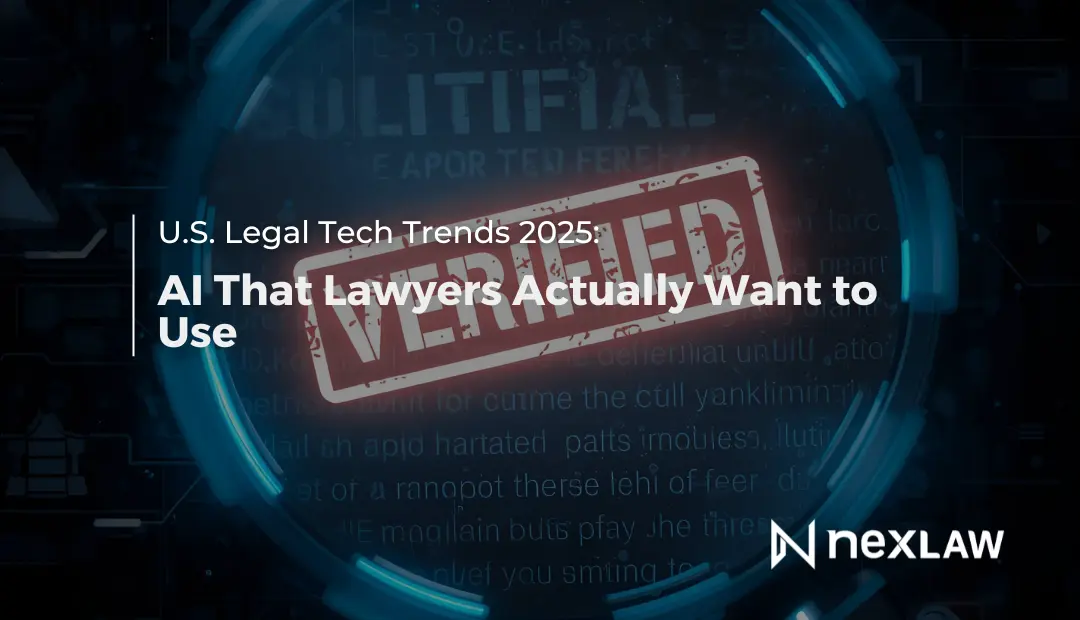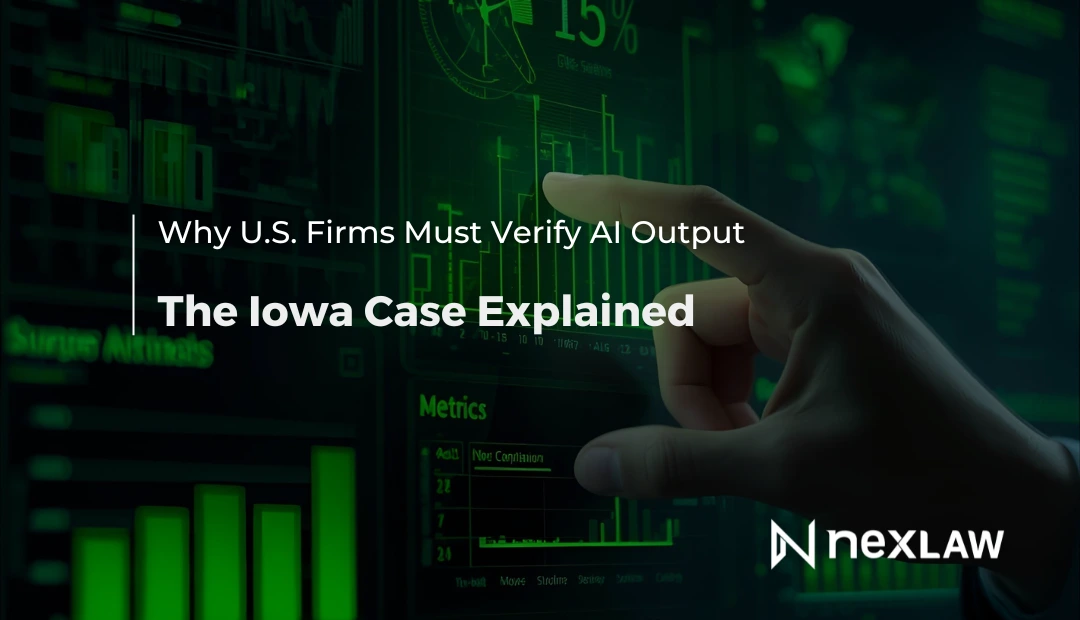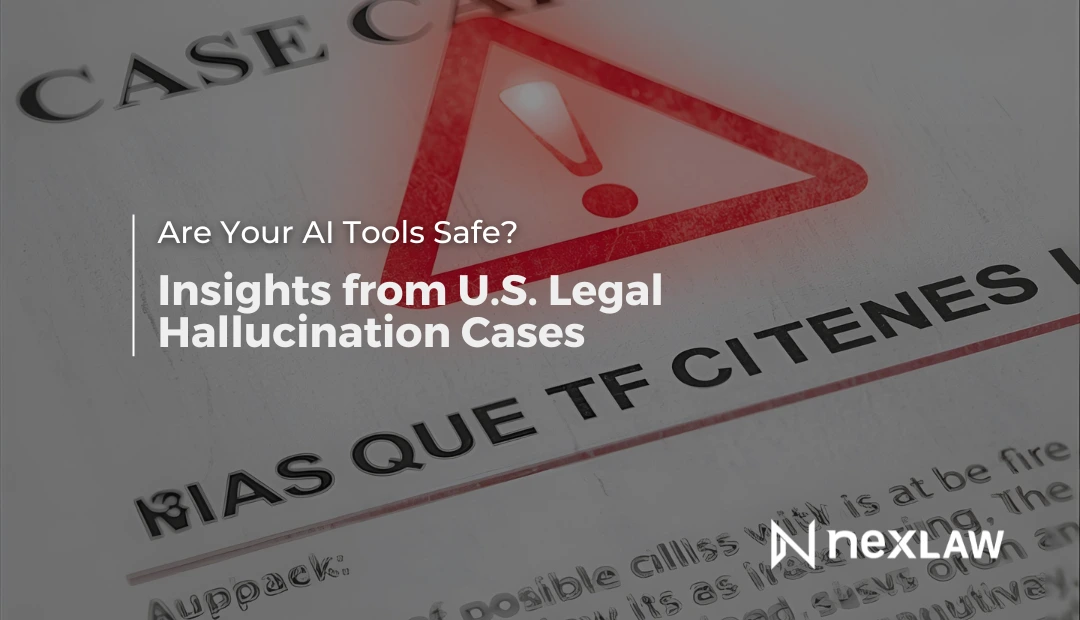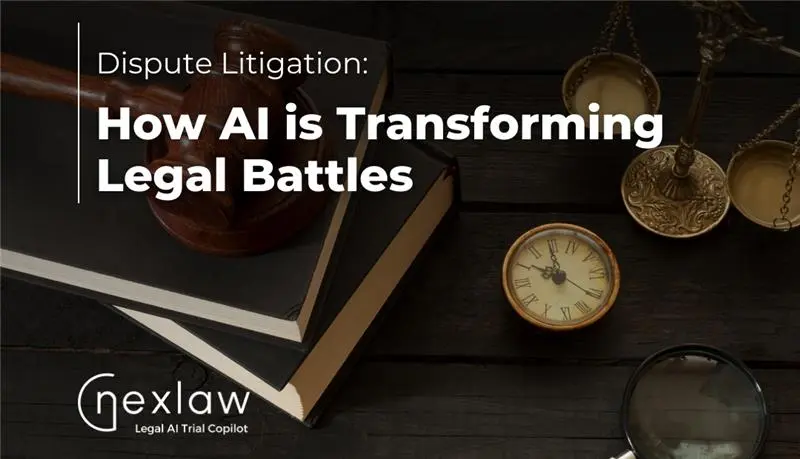Top 10 AI Legal Tools Revolutionizing the U.S. Legal Industry
Trusted Legal AI for U.S. Lawyers
NexLaw’s expert AI analyze vast case files, seamlessly research, summarize, review & draft contracts, and answer legal queries with verified sources.
The legal industry in the United States is undergoing a transformative shift, thanks to the integration of Artificial Intelligence (AI). AI-powered tools are automating routine tasks, enhancing legal research, and improving client interactions, making legal practices more efficient and cost-effective. Here’s a look at ten leading AI legal tools that are making waves in the U.S. legal sector.
Top 10 AI Legal Tools Revolutionizing the U.S. Legal Industry
1. NexLaw’s TrialPrep – Revolutionizing Trial Preparation

NexLaw’s TrialPrep is designed to streamline the trial preparation process, making it easier for legal professionals to handle the entire litigation process efficiently.
Key Features
- Advanced AI for legal research and document analysis
- Comprehensive legal analysis reports tailored to specific cases
- Automation of document preparation, from pleadings to trial-related documents
Best For
- Legal professionals preparing for trials
- Small to Medium-Sized Firms
Pros and Cons
| Pros | Cons |
|---|---|
| Reduces trial preparation time significantly | Only focuses on litigation processes |
| Comprehensive insights into case strategies | May require internet access for full functionality |
Pricing Plans
- More flexible and accessible pricing for small to medium-sized firms
2. NexLaw’s NeXa – Your Bespoke Counsel’s Assistant
NexLaw’s NeXa is an expert mode designed to streamline daily tasks for legal professionals, enhancing efficiency and accuracy in legal research and documentation.
Key Features
- Deep research: Find answers with case laws, legislation, and secondary sources
- Documents Insight: Upload a series of case files or legal docs, enter specific queries for NeXa to analyze and generate detailed insights.
- Contract Due Diligence: Efficiently identifies legal risks and ensures compliance with regulations
- Compare Jurisdictions: Compare laws and regulations across multiple jurisdictions efficiently
- Find precedents: Look for precedents related to your specific case with precision and relevance
Best For
- Commercial lawyers managing complex transactions
- Legal teams streamlining M&A due diligence
- Firms handling extensive case files efficiently
- Lawyers needing quick, comprehensive legal insights
- Litigation lawyers simplifying trial prep and strategy
Pros and Cons
| Pros | Cons |
|---|---|
| Broad use case compatibility, making it useful across diverse legal practices | Does not address generic questions unrelated to legal tasks |
| Comprehensive insights into case strategies | Full functionality may require internet access |
Pricing Plans
- More flexible and accessible pricing for small to medium-sized firms
3. Casetext CoCounsel
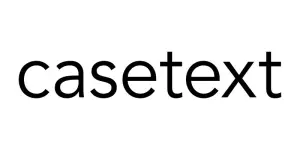
Casetext CoCounsel is an AI-powered legal assistant designed to assist attorneys with legal research, document review, and contract analysis. Leveraging advanced natural language processing, it delivers highly accurate and efficient results, helping lawyers streamline their workflows.
Pros and Cons
| Pros | Cons |
|---|---|
| Highly accurate legal research | Limited customization options |
| Automates tedious tasks | Subscription cost may be high for solo practitioners |
| Integrates well with existing legal software |
4. ChatGPT

Developed by OpenAI, ChatGPT is a versatile AI tool that legal professionals use for drafting legal documents, generating content, and automating client communications. Its ability to understand and generate human-like text makes it an invaluable resource for various legal applications.
Pros and Cons
| Pros | Cons |
|---|---|
| Cost-effective for legal content creation | May require human oversight for accuracy |
| Can handle a variety of legal writing tasks | Not specialized for legal research |
| Easy to integrate into daily workflows |
5. Lex Machina
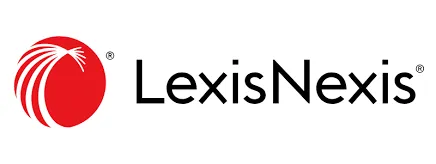
A subsidiary of LexisNexis, Lex Machina provides legal analytics by mining litigation data to offer insights on judges, lawyers, and case outcomes. This AI-driven tool helps legal professionals craft informed strategies and better understand litigation trends.
Pros and Cons
| Pros | Cons |
|---|---|
| In-depth litigation analytics | Requires a LexisNexis subscription |
| Helps predict case outcomes | May not be as useful for non-litigation legal work |
| Provides insights into judicial behavior |
6. Everlaw
.webp)
Everlaw is a leading AI-driven e-discovery platform that streamlines document review and analysis. By quickly identifying relevant information, it reduces the time and cost associated with large-scale document examinations, making it indispensable for law firms handling complex cases.
Pros and Cons
| Pros | Cons |
|---|---|
| Efficient document review and e-discovery | Primarily useful for litigation teams |
| Saves time in litigation preparation | Can be expensive for smaller firms |
| Secure cloud-based platform |
7. Diligen

Diligen is an AI-powered contract review platform that automates the extraction and analysis of key contract terms. It helps legal teams efficiently manage due diligence and contract analysis, ensuring that crucial risks and obligations are identified.
Pros and Cons
| Pros | Cons |
|---|---|
| Automates contract analysis | Limited to contract-related tasks |
| Improves efficiency in due diligence | Some features may require manual review |
| Customizable templates for various contract types |
8. Smith.ai

Smith.ai provides AI-driven virtual receptionist services that manage client communications through phone and chat. This tool ensures prompt responses to client inquiries, schedules appointments, and enhances overall client engagement for law firms.
Pros and Cons
| Pros | Cons |
|---|---|
| Enhances client communication and responsiveness | Best suited for client-facing tasks only |
| Reduces administrative workload | AI may not fully understand complex legal queries |
| Integrates with CRM systems |
9. Relativity

Relativity is a powerful AI-enabled e-discovery platform designed to help legal teams manage large volumes of data. Its machine learning capabilities assist in organizing, reviewing, and analyzing documents efficiently, making it a valuable asset for litigation support.
Pros and Cons
| Pros | Cons |
|---|---|
| Strong e-discovery and data management capabilities | High cost for smaller firms |
| Scalable for large litigation cases | Requires training to maximize efficiency |
| Advanced AI for sorting and analyzing data |
10. Harvey

Harvey is an AI-powered legal research and drafting platform that helps lawyers automate document creation and gain insights through machine learning. This tool enhances accuracy and efficiency in delivering legal services.
Pros and Cons
| Pros | Cons |
|---|---|
| Streamlines legal research | May not replace traditional legal research methods entirely |
| Generates drafts quickly | Requires oversight to ensure accuracy |
| Improves document accuracy |
Practical Guide to Implementing AI Legal Tools in the US
Implementing AI tools in legal practices in the US requires a strategic approach to streamline workflows, improve efficiency, and reduce operational costs. Here’s a step-by-step guide for law firms across the United States to successfully select and implement AI tools in their operations:
Evaluate the Needs and Goals
The first step in adopting AI tools is to understand the unique needs of your law firm. Assess areas where AI could provide the greatest impact, such as:
- Document Management: AI tools can help manage large volumes of documents, automating organization, indexing, and retrieval.
- Legal Research: AI-powered research tools can analyze case law and legal texts, offering faster and more accurate results than traditional methods.
- Contract Review and Management: AI can help identify and extract critical clauses, flagging potential risks or inconsistencies in contracts.
- Client Communication: AI can automate responses to common client queries and assist in streamlining case management.
By clearly defining the areas where AI could provide the most value, your firm can select the most relevant technologies.
Investigate and Choose AI Tools
With a clear understanding of your needs, it’s time to explore and choose the right AI tools. When selecting legal AI software, consider the following factors:
- Use Case Fit: Choose AI tools designed specifically for your firm’s identified needs (e.g., document automation, e-discovery, or legal research).
- Integration with Existing Systems: The AI tool must seamlessly integrate with your existing software and infrastructure, such as your document management systems or case management software.
- Scalability: Select AI tools that can scale with your firm as it grows and as your AI needs evolve.
- Data Security and Compliance: Ensure that any AI tool you choose complies with relevant regulations like the American Bar Association’s (ABA) Model Rules of Professional Conduct, data protection laws (e.g., California Consumer Privacy Act (CCPA)), and other US privacy standards.
- Vendor Reputation and Support: Choose a vendor with a solid track record in the legal industry. Ensure they provide good customer support and ongoing updates to the tools.
Some AI solutions widely used in the US legal market include ROSS Intelligence, Casetext, Luminance, and Kira Systems. Researching these tools and attending legal tech conferences (e.g., LegalTech NY) can help you make an informed decision.
Pilot and Assess
Before fully implementing AI tools across the firm, conduct a pilot program to assess their effectiveness in a controlled environment:
- Select a Pilot Area: Start with a specific practice area or department. For example, pilot an AI tool in your litigation team to automate the legal research process or use contract review AI in your corporate team.
- Set Performance Metrics: Establish clear KPIs (e.g., reduction in hours spent on tasks, accuracy improvements, or cost savings) to measure the success of the pilot.
- Gather Feedback: Collect feedback from team members using the AI tools to understand their experience, potential roadblocks, and suggestions for improvement.
Some AI solutions widely used in the US legal market include ROSS Intelligence, Casetext, Luminance, and Kira Systems. Researching these tools and attending legal tech conferences (e.g., LegalTech NY) can help you make an informed decision.
Train Your Team
AI tools are only effective if your team can use them properly. Proper training ensures smooth adoption and usage:
- Role-Specific Training: Customize training programs to address the specific needs of different roles in your firm. For example, lawyers may need training on interpreting AI-generated research, while paralegals may need guidance on managing AI-assisted document workflows.
- Emphasize AI’s Role in Efficiency: Promote the benefits of AI as a tool to augment human effort, not replace it. Training should highlight how AI enhances productivity and allows lawyers to focus on more complex, value-added tasks.
- Ongoing Education: AI technology evolves rapidly, so provide continuous learning opportunities and keep your team up to date with the latest features, updates, and best practices.
Change management strategies will be vital to overcoming resistance from staff members who may be apprehensive about adopting new technologies.
Monitor and Optimize
AI integration doesn’t end with implementation. Continuous monitoring and optimization are essential for long-term success:
- Track Key Performance Indicators (KPIs): Regularly evaluate AI tool performance against your initial KPIs. Consider metrics such as time saved, cost reduction, accuracy improvements, and user satisfaction.
- Collect Feedback Continuously: Encourage your team to share ongoing feedback about the AI tools’ usability and performance. This will allow you to make adjustments as needed.
- Stay Compliant with Evolving Legal Regulations: Laws and regulations, including those governing client confidentiality and AI ethics, can change over time. Make sure your AI tools stay compliant with new legal standards and data privacy laws, such as the California Consumer Privacy Act (CCPA) and General Data Protection Regulation (GDPR) for firms with international clients.
- Adapt and Evolve: As AI tools advance, new features and capabilities may be released. Ensure that your tools are updated regularly to incorporate improvements in machine learning models, natural language processing (NLP), and other evolving technologies.
Finally, as AI technology continues to improve, explore advanced tools, such as predictive analytics for case outcomes or AI-based tools for automated discovery. Staying current on legal technology trends will help your firm remain competitive.
By following this guide, law firms in the US can implement AI tools effectively, driving greater efficiency, reducing costs, and delivering better value to clients. With careful planning, training, and ongoing optimization, AI can become an integral part of your firm’s strategy for success.
Key Takeaways
The adoption of AI in the legal industry is reshaping how law firms and legal departments operate in the United States. These AI tools are driving efficiency, improving accuracy, and enhancing client satisfaction. As AI technology continues to evolve, legal professionals who embrace these innovations will gain a significant competitive edge in the ever-changing legal landscape. NexLaw AI’s Legal AI tools allow you to automate repetitive tasks, keep your legal research well-organized, and generate insightful reports on critical business metrics, helping your firm become more profitable and productive. Interested in exploring how it works? Book a demo today!

